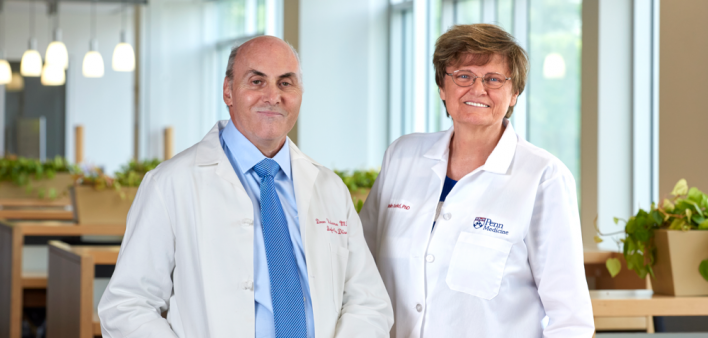The 2023 Nobel Prize in Physiology or Medicine was awarded to two scientists who made key discoveries that led to the development of the messenger RNA (mRNA) COVID-19 vaccines credited with preventing countless deaths worldwide.
On October 2, the Nobel Assembly at the Karolinska Institute in Stockholm announced the award to biochemist Katalin Karikó, PhD, and immunologist Drew Weissman, MD. Karikó is only the 13th woman to become a Nobel laureate in physiology or medicine. The two scientists will share a prize of about $1 million.
“The vaccines have saved millions of lives and prevented severe disease in many more, allowing societies to open and return to normal conditions,” the Nobel Assembly stated in its announcement. “Through their fundamental discoveries of the importance of base modifications in mRNA, this year’s Nobel laureates critically contributed to this transformative development during one of the biggest health crises of our time.”
BREAKING NEWS
— The Nobel Prize (@NobelPrize) October 2, 2023
The 2023 #NobelPrize in Physiology or Medicine has been awarded to Katalin Karikó and Drew Weissman for their discoveries concerning nucleoside base modifications that enabled the development of effective mRNA vaccines against COVID-19. pic.twitter.com/Y62uJDlNMj
A method for instructing cells how to make proteins, mRNA technology has the potential to prevent infections ranging from influenza to HIV and to treat diseases as diverse as cancer and sickle cell disease. After researchers learned how to make mRNA in a lab in the 1980s, it was understood that the technology had many potential applications, but the unmodified synthetic molecule is unstable and triggers harmful inflammatory reactions, so it is not suitable for use in its original form.
For decades, Karikó studied how to use mRNA as a medical therapy, coming up against numerous hurdles. Her quest for National Institutes of Health funding was thwarted and she was not granted tenure at the University of Pennsylvania. Instead, she took a position with BioNTech, then a little-known biotechnology start-up in Germany, eventually becoming a senior vice president. She is currently an adjunct professor at UPenn and a professor at Szeged University in Hungary, where she earned her PhD in 1982.
“These obstacles did not discourage the Hungarian biochemist Katalin Karikó, who was devoted to developing methods to use mRNA for therapy,” according to the Nobel Assembly. “[S]he remained true to her vision of realizing mRNA as a therapeutic despite encountering difficulties in convincing research funders of the significance of her project.”
In a chance encounter over a photocopier at the university 25 years ago, Karikó met Weissman, who earned his MD and PhD from Boston University in 1987 and did clinical training at Harvard Medical School and postdoctoral research at the National Institutes of Health. Much of his career has been devoted to developing HIV vaccines. He is now a professor of vaccine research at UPenn and director of the Penn Institute for RNA Innovations.

mRNA contains four different bases, A, U, G and C. Karikó and Weissman discovered that base-modified mRNA can be used to block activation of inflammatory reactions and increase protein production when mRNA is delivered to cells.The Nobel Committee for Physiology or Medicine. Illustration: Mattias Karlén
Working together, the two scientists figured out how to alter mRNA by modifying one of its chemical bases, or letters in the genetic code. In addition—along with many collaborators over the years—they developed a method for packaging the modified mRNA into lipid nanoparticles, or fat bubbles, to protect the delicate nucleic acid from rapid destruction in the body.
Some biotechnology companies began exploring mRNA vaccines in the 2010s, but it took another decade for Karikó and Weissman’s work to come to fruition.
"We couldn’t get funding, we couldn’t get publications, we couldn’t get people to notice RNA as something interesting,” Weissman said at a media briefing after the Nobel announcement. “RNA had failed in clinical trials, and pretty much everybody had given up on it.”
But in 2020, the technology was used to create the Pfizer-BioNTech and Moderna COVID vaccines in record time. What’s more, the mRNA platform allows scientists to plug in genetic code from new viral variants as they evolve, enabling the rapid development of new versions of the vaccines that better target the latest circulating strains.
The mRNA technology developed by Karikó and Weissman has applications far beyond COVID vaccines. It is now being employed to speed up the development of vaccines to prevent HIV, using a novel approach known as germline targeting. BioNTech, Moderna and other companies are working on mRNA vaccines for numerous other infectious diseases, including respiratory syncytial virus (RSV), mpox (formerly monkeypox), Epstein-Barr virus, herpes simplex virus and Lyme disease.
mRNA technology also has the potential to fight cancer by encoding abnormal proteins from tumors rather than bits of viruses. Researchers have recently reported that the mRNA approach has shown promise for treating melanoma, pancreatic cancer and cancers caused by human papillomavirus.
“Every once in a while, you get a discovery that is transformative in that it’s not only for a specific discovery itself, but it essentially impacts multiple areas of science—and that’s what mRNA technology is,” Anthony Fauci, MD, the former director of the National Institute of Allergy and Infectious Diseases, told the Washington Post.







Comments
Comments